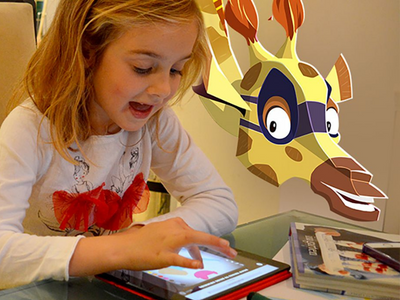How Laughter Can Help Your Child Learn


Are you looking for ways to help your child learn more successfully? We recommend that you introduce humor into your child's learning and start encouraging laughter. Pairing learning with laughter can be incredibly beneficial for your child’s education and general well-being.

We’re definitely not joking when we say that there’s nothing quite like laughter. In A Christmas Carol, Charles Dickens famously wrote, “There is nothing in the world so irresistibly contagious as laughter and good humor.”
More and more studies are emerging regarding the importance of laughter for a human’s wellbeing. There’s a reason that people say laughter is the best medicine. In ‘Stress relief from laughter? It's no joke’, the Mayo Clinic Staff explain that laughter is not only good for a person’s mental state, but also for their physical wellness. Having a good laugh or giggle immediately increases a person’s oxygen intake which is good for their organ function, but it also relieves their stress responses and soothes tension.
Incorporating laughter into a daily routine also has long term benefits such as improving one’s general mood, feeling personally satisfied and boosting the immune system.
What space is there for laughter while learning?
Whether your child is being taught in a classroom or homeschooling one-on-one, we all know that the learning process can be tough. Figuring out how to keep your child engaged and focused while also actually getting them to retain all the information taught (with topics they might be reluctant to learn) can be incredibly hard.
Humor can help to address this, and actually has been proven to improve a child's learning performance. In ‘How Laughing Leads to Learning’, Zak Stambor from The American Psychological Association says, “When used effectively, classroom comedy can improve student performance by reducing anxiety, boosting participation and increasing students' motivation to focus on the material.”
Over time, many parents and teachers have used different strategies to incorporate humour without losing control of the classroom.
In ‘Learning with Laughter’, Rose Senior from The Guardian writes that teachers have used “tried and tested techniques, in the form of facial expressions, exaggerated gestures, plays on words, well-worn quips and so on….”
Whether you apply your humor in expressions, gestures or wit, chances are your child will engage more with you and learn better.
6 reasons why you should encourage learning with laughter for your child
1. Laughter reduces stress
Let’s face it - learning can be very stressful! Children have exams to pass and are worried about getting all of their work done. Some may even worry about their future and getting into their top-choice schools.
With these worries in mind, the classroom environment can be a daunting experience, especially if the child is a reluctant learner towards the particular topic.
For some children, learning might not be associated with being ‘fun’, which can prevent them from engaging properly.
As mentioned earlier, laughing has been proven to reduce stress and promote a child's overall well-being.
In fact, laughter is not too far off from having fun and being creative. Night Zookeeper was created with the intention of making learning fun and engaging for a child. This is why we’ve gamified our program and encouraged children to utilize their imaginations and explore their creativity.
Bringing in elements of fun engages children and reminds children that learning doesn’t have to be boring. For creative writing in particular, this can make children more open to writing down their thoughts and even sharing their work with their peers.
Whether your child is remotely learning, homeschooling or newly going back to school, there is a lot more pressure and changes with the current educational climate. In response to this rising amount of stress and anxiety in children, we recently wrote an article about how creative writing can also provide vital support for a child’s well-being during the lockdown period.
Now more than ever, looking to incorporate humor, creativity and lightheartedness into your child's learning process can provide vital support for your children’s wellbeing and educational career.
2. There’s more room to make mistakes and more openness to fix them
Everyone makes mistakes. Sometimes the reason why a child is a reluctant learner is because they are afraid of their work being judged or criticized. It’s hard enough to get ideas down on paper and writing involves constant constructive feedback and revision in order for a writer to get better. That can be quite daunting.
If you learn how to embrace your own small mistakes with humor and intentionally make light of the situation, it will allow your child to learn that they too can make mistakes without dire consequence.
In creative writing, the feedback and revision process is crucial towards a child’s writing development. In order to improve on their writing, writers need to be open to getting constructive feedback from their teachers and peers. This can be a very overwhelming experience for a child; the idea of having someone tell them they need to improve. It can be even harder to go back, revise and add the improvements.
If the environment in which a child is given feedback is lighthearted and open to the option of making mistakes, then the student may be more willing to make the edits.
3. Increased willingness to participate
If a child is able to laugh during their learning process, they may be more eager to absorb what is being taught. Humor injects a bit of spark in a situation that otherwise could be serious or even slightly boring for some students.
If the teaching delivery is easy-going, lighthearted and fun, your child may be more open to participating in answering questions and partaking in group discussions.

4. Increased retention
As a child, I’ve always remembered certain things that were taught to me with humor. My 6th grade Foreign Languages Teacher decided to use humor to teach Latin. He taught us how to remember saying “it’s snowing” (ninguit) and “it’s raining” in Latin (pluit) by teaching it in a funny dance and song. For snow, we made dots in the air and for rain we shimmied our fingers. I learned this when I was 11 and have never forgotten it.
This is because I was engaged and delighted to dance and sing in class while learning.
Personally, learning through humor for me was directly linked to long-term retention. I can’t say I remember all of the Latin I learned when I was 11, but I do remember that humorous song.
In 'Laughter and Learning: Humor Boosts Retention', Sarah Henderson writes, “Humor activates the brain's dopamine reward system, stimulating goal-oriented motivation and long-term memory, which means that humor can improve retention in students of all ages.”
The benefits of laughter apply to all humans, big or small. It’s a comfort to know that implementing humor brings mental and health benefits to you, in addition to your students.
5. Increased comfort levels
Sometimes it’s hard to participate in a group dynamic. Shy, introverted children may dread getting called on to answer questions and might not have the best time adjusting to a group setting.
If a child is exposed to an all-business, stern and strict learning environment, it may increase anxiety for that child who fears they will say the wrong thing when called upon in class. Additionally, this child may also lose confidence in the work they submit. A little bit of laughter and humor, mixed with a warm and open atmosphere can do wonders for a child’s demeanor.
6. Humor creates a sense of sharing
When you introduce humor into the learning process, it allows some space for a child to to laugh. By allowing the child to take a moment to laugh, it essentially creates the ability for a shared positive social exchange and slight social relief. In effect, your child will be more open to listening to you, engaging with you and responding to your questions.
We hope you will consider incorporating laughter into your child's learning. As you’ve seen above, incorporating learning with laughter can be incredibly beneficial for your child’s education and general well-being.

If you’re interested in adding more fun and play into your child’s learning, try Night Zookeeper's reading and writing program for kids - start a free 7 day trial today!
Follow us on social media:


Make Reading & Writing Fantastically Fun!
- Award-winning reading & writing program for kids
- Improves spelling, grammar, punctuation & vocabulary
- Over 1,000 different learning games and activities


What is Hybrid Learning?


“My child hates writing.” What do I do?


25 Creative Writing Prompts for Kids


